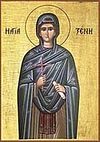

| Previous day | Next day |
| Old Style
May 3
|
Monday |
New Style
May 16
|
| 4th Week after Pascha. Tone 3. | No fast.
|
![]() Martyrs Timothy the Reader and his wife Maura, of Antinoe in Egypt (ca. 286).
Martyrs Timothy the Reader and his wife Maura, of Antinoe in Egypt (ca. 286). ![]() St. Theodosius, abbot of the Kiev Caves Monastery and founder of coenobitic monasticism in Russia (1074).
St. Theodosius, abbot of the Kiev Caves Monastery and founder of coenobitic monasticism in Russia (1074).
St. Peter the Wonderworker, bishop of Argos (ca. 928). Translation of the Dormition Icon of the Most Holy Theotokos from Constantinople to the Kiev Caves Lavra (1073). St. Theophanes of Vatopedi, metropolitan of Peritheorion (14th c.). Schema-abbess Juliana (1393) and Schemanun Eupraxia (1394), of the Monastery of the Conception in Moscow. St. Gregory, bishop of Rostov and Yaroslavl (1416).
New Hieromartyr Vladimir Izvolsky, archpriest, of Manchuria (1930).
“Svensk” Icon of the Most Holy Theotokos (1288).
Great-martyr Xenia the Wonderworker, of the Peloponnese (318). St. Ecumenius the Wonderworker, bishop of Tricca (4th c.). St. Mamai, catholicos of Georgia (744). Sts. Michael and Arsenius the Georgians (9th c.). St. Ansfried, bishop of Utrecht (1010). Martyr Paul of Vilnius, Lithuania (17th c.). New Martyr Achmed (Ahmet) the Calligrapher, at Constantinople (1682). St. Irodion, abbot, of Lainici Monastery (Romania) (1900). Martyrs Diodorus and Rhodopianus, deacon, at Aphrodisia in Anatolia (285-305). Finding of the relics of St. Luke of Mt. Steirion (953). Sts. Silas (1783), Paisius and Nathan (1784), monks of Putna Monastery (Moldova).
Thoughts for Each Day of the Year
According to the Daily Church Readings from the Word of God
By St. Theophan the Recluse

Monday. [Acts 10:1–16; John 6:56–69]
When the Lord presented His teaching about the mystery of His Body and Blood, setting it as a necessary condition for communication with Himself and as a source of true life, then many of His disciples went back, and walked no more with Him (John 6:66). Such an act of God’s boundless mercy toward us seemed too miraculous to them, and their disinclination toward the miraculous tore them from the Lord. The Lord saw this, and although He was prepared to be crucified for the salvation of every person, He did not consider it possible to diminish or cancel the miraculous. It is so crucial in the economy of our salvation! Albeit with regret, He allowed them to depart from Him into the darkness of unbelief and destruction; and said to them and to the chosen twelve as well, will ye also go away? (John 6:67) This showed that He was ready to let them go also, if they could not bow down before the miraculous. So it is, that to flee from the miraculous is to flee from the Lord and Saviour; and one who turns away from the miraculous is as one who is perishing. May those who are horrified by the miraculous heed this! Even they will come across a miracle which they will not be able to thwart: death, and after death, judgment. But whether this inability to thwart it will serve them unto salvation, only God knows.
Articles
 Martyr Timothy the Reader and his wife in EgyptSaints Timothy and Maura suffered for the faith during the persecution under the emperor Diocletian (284-305). |
 St. Peter the Wonderworker and Bishop of ArgosSaint Peter the Wonderworker, Bishop of Argos in the Peloponnesos, lived during the ninth and early tenth centuries, and was raised by pious parents. |
 Icon of the Mother of God of SvenThe Sven Caves Icon of the Mother of God was painted by Saint Alypius of the Caves (August 17). |






